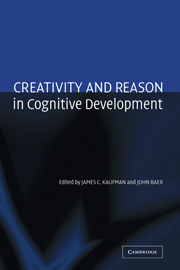Book contents
- Frontmatter
- Contents
- List of Contributors
- Acknowledgments
- Creativity and Reason in Cognitive Development
- Introduction
- COGNITIVE PERSPECTIVES
- 1 Expertise and Reason in Creative Thinking: Evidence from Case Studies and the Laboratory
- 2 Creative Genius, Knowledge, and Reason: The Lives and Works of Eminent Creators
- 3 Dynamic Processes Within Associative Memory Stores: Piecing Together the Neural Basis of Creative Cognition
- 4 The Creativity of Everyday Moral Reasoning: Empathy, Disgust, and Moral Persuasion
- 5 Reasoning and Personal Creativity
- 6 Alternative Knowledge Structures in Creative Thought: Schema, Associations, and Cases
- 7 The Role of the Knowledge Base in Creative Thinking
- 8 The Role of Domain Knowledge in Creative Problem Solving
- 9 Creative Thinking and Reasoning: Can You Have One Without the Other?
- 10 From Alexithymia, Borne of Trauma and Oppression, to Symbolic Elaboration, the Creative Expression of Emotions, and Rationality
- 11 Opening up Creativity: The Lenses of Axis and Focus
- DEVELOPMENTAL AND EDUCATIONAL PERSPECTIVES
- Author Index
- Subject Index
- References
3 - Dynamic Processes Within Associative Memory Stores: Piecing Together the Neural Basis of Creative Cognition
Published online by Cambridge University Press: 19 January 2010
- Frontmatter
- Contents
- List of Contributors
- Acknowledgments
- Creativity and Reason in Cognitive Development
- Introduction
- COGNITIVE PERSPECTIVES
- 1 Expertise and Reason in Creative Thinking: Evidence from Case Studies and the Laboratory
- 2 Creative Genius, Knowledge, and Reason: The Lives and Works of Eminent Creators
- 3 Dynamic Processes Within Associative Memory Stores: Piecing Together the Neural Basis of Creative Cognition
- 4 The Creativity of Everyday Moral Reasoning: Empathy, Disgust, and Moral Persuasion
- 5 Reasoning and Personal Creativity
- 6 Alternative Knowledge Structures in Creative Thought: Schema, Associations, and Cases
- 7 The Role of the Knowledge Base in Creative Thinking
- 8 The Role of Domain Knowledge in Creative Problem Solving
- 9 Creative Thinking and Reasoning: Can You Have One Without the Other?
- 10 From Alexithymia, Borne of Trauma and Oppression, to Symbolic Elaboration, the Creative Expression of Emotions, and Rationality
- 11 Opening up Creativity: The Lenses of Axis and Focus
- DEVELOPMENTAL AND EDUCATIONAL PERSPECTIVES
- Author Index
- Subject Index
- References
Summary
Memory is essential for creativity. Consider, for example, the classical four-stage model of creativity proposed by Wallas (1926), based on the ideas of Helmholtz (1896). In this model, creative achievement occurs through preparation, incubation, illumination, and verification. Clearly, memory processes figure prominently at every stage of this model. Preparation, the stage in which adequate knowledge of the creative domain is acquired, necessarily involves extensive encoding of information and the ability to retain that information over time. Verification, the stage in which creative output is evaluated in terms of its accuracy or utility, must involve the retrieval of information and skills necessary for the appraisal. The incubation and illumination stages involve memory processes insofar as previously acquired information is recombined to generate and recognize a novel idea. How can memory be so flexible such that information acquired in one way can be manipulated and recapitulated in so many other ways? What clues are there to the brain mechanisms underlying these dynamic memory processes?
We attempt to address these questions in this chapter by conceptualizing creative cognition as a set of separable but interdependent cognitive processes that collectively generate creative output. We are particularly interested in processes that interact with information stored in memory to either facilitate or hinder the novel recombining of ideas that is characteristic of creative cognition. We first describe the associationist approach to creativity, one that is amenable to a variety of cognitive and neuroscientific analyses.
Information
- Type
- Chapter
- Information
- Creativity and Reason in Cognitive Development , pp. 60 - 80Publisher: Cambridge University PressPrint publication year: 2006
References
Accessibility standard: Unknown
Why this information is here
This section outlines the accessibility features of this content - including support for screen readers, full keyboard navigation and high-contrast display options. This may not be relevant for you.Accessibility Information
- 15
- Cited by
